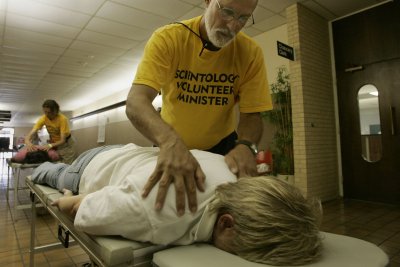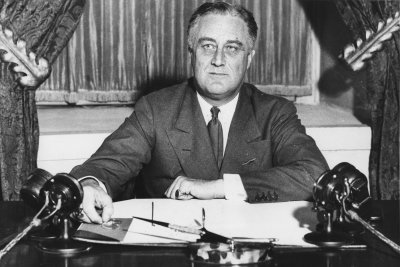Topic: L. Ron Hubbard
Lafayette Ronald Hubbard (March 13, 1911 – January 24, 1986), better known as L. Ron Hubbard (and often referred to by his initials, LRH), was an American pulp fiction author and religious leader who founded the Church of Scientology. After establishing a career as a writer of pulp fiction, becoming best known for his science fiction and fantasy stories, he developed a self-help system called Dianetics which was first published in 1950. He subsequently developed his ideas into a wide-ranging set of doctrines and rituals as part of a new religious movement that he called Scientology. His writings became the guiding texts for the Church of Scientology and a number of affiliated organizations that address such diverse topics as business administration, literacy and drug rehabilitation.
Although many aspects of Hubbard's life story are disputed, there is general agreement about its basic outline. Born in Tilden, Nebraska, he spent much of his childhood in Helena, Montana. He traveled in Asia and the South Pacific in the late 1920s after his father, an officer in the United States Navy, was posted to a U.S. naval base on Guam. He attended George Washington University in Washington, D.C. at the start of the 1930s before beginning a career as a prolific writer of pulp fiction stories. He served in the U.S. Navy during World War II, commanding vessels in the Atlantic and Pacific Oceans. He ended the war in a hospital. Later he developed Dianetics, "the modern science of mental health". He founded Scientology in 1952 and oversaw the growth of the Church of Scientology into a worldwide organization. During the late 1960s and early 1970s, he spent much of his time at sea aboard his personal fleet of ships as Commodore of the Sea Organization, an elite inner group of Scientologists. He returned to the United States in the mid-1970s but went into seclusion at the end of the decade, dying on a ranch near Creston, California, in January 1986.
Hubbard was and remains an extremely controversial figure and many details of his life are still disputed. The Church of Scientology depicts Hubbard in hagiographic terms, drawing on his legacy as its ultimate source of doctrine and legitimacy. He portrayed himself as a pioneering explorer, world traveler and nuclear physicist with expertise in a wide range of disciplines including photography, art, poetry and philosophy. His critics have characterized him as a liar, a charlatan and a madman, and many of his autobiographical statements have been proven to be fictitious. The Danish historian of religions Dorthe Refslund Christensen concludes that the Church of Scientology's narrative "becomes meaningful only if it is perceived as a legend or a myth," though the Church itself rejects any suggestion that its account of Hubbard's life is anything other than plain historical fact.
It uses material from the Wikipedia article "L. Ron Hubbard."








